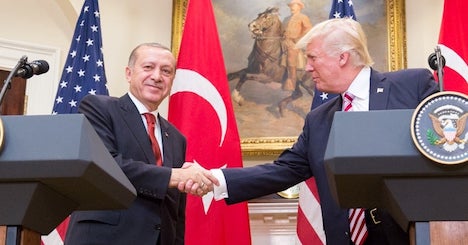|

|
Remember the media outrage when Turkey was found guilty of war crimes? No, neither do we.
 Print This Print This
By Ed Sykes | The Canary
The Canary
Monday, Oct 14, 2019
 |
| Donald Trump and Recep Tayyip Erdoğan shaking hands in front of US and Turkish flags |
NATO member Turkey invaded northern Syria on 9 October, attacking largely-Kurdish fighters who led the way in defeating Daesh (Isis/Isil). There are now allegations that “Turkish-backed terrorist groups are committing war crimes” in the region. And that wouldn’t come as a surprise. Because although there was little media outrage when it happened, Turkey was already found guilty of war crimes against Kurdish communities back in 2018.
“Burning of civilians alive and the destruction of whole cities”
As The Canary revealed in May 2018, “the Permanent Peoples’ Tribunal (PPT) found [Turkish leader Recep Tayyip] Erdoğan and the Turkish state guilty of war crimes, as well as crimes against humanity, against the Kurdish people”. The Canary attended the hearing, reporting that:
The session included graphic accounts from eye-witnesses of the Turkish state’s treatment of Kurdish communities in southeastern Turkey between 1 June 2015 and 31 December 2017. We heard accounts of the burning of civilians alive and the destruction of whole cities.
The PPT “rejected the Turkish state’s characterisation of the conflict as a matter of terrorism”, saying “the war crimes and crimes against humanity determined by the court derive from the Turkish state’s refusal to recognise the Kurdish people’s right to self determination”. The tribunal also reported “targeted assassinations, extrajudicial executions, [and] forced disappearances”. And it specifically said:
The Turkish state, … Erdoğan and the commander of the military operations… are guilty of committing war crimes.
Turkey’s longstanding repression of Kurdish people and the left
War crimes in recent years come amid a long history of consistent Turkish repression and massacres in Kurdish communities. After the Second World War, this repression spread to anything left-wing. Because in 1952, Turkey became a NATO member. And as a result, academic Behlül Özkan wrote in 2017, “anti-communism, which became the backbone of its state ideology, was fortified by nationalist and conservative values”.
NATO soon oversaw the creation of ‘stay-behind armies‘ that sought to contain the ‘spread of communism’. Many refer to this as ‘Operation Gladio’. And in Turkey, this reportedly saw links sprout between the state, ultranationalists, and “organised crime groups”, which would allegedly be responsible for “hundreds of extra-judicial killings and bombings”. The Middle East Institute cites a “former Italian magistrate” referring to “the Turkish branch of Operation Gladio” as “the most powerful of all stay-behind branches”. Indeed, there were numerous military coups in Turkey in the following decades, and in 1980, “the coup generals were also the leaders of the Turkey branch of NATO’s Operation Gladio”.
The left-wing Kurdistan Workers’ Party (PKK) arose in this context. And the war between the Turkish state and the PKK continues today. There have been big losses on both sides during this conflict and, as in most wars, civilians were often caught in the middle. But today, the PKK and its allies condemn all attacks on civilians. Several European courts have ruled that Europe should not consider the PKK as a terrorist group but as a “party to an armed conflict”.
In recent years, a peace agreement looked increasingly possible; until Erdoğan ended the process in 2015 and repressed his political opponents by calling them ‘terrorists’. One reason he torpedoed these talks was the success of the Kurdish-led revolution of northern Syria (aka Rojava), which gave hope to Kurds and progressives campaigning for democracy in Turkey.
For how long will NATO allies ignore Turkey’s war crimes?
In 2018, Turkish-led forces invaded and occupied the Rojavan region of Afrin. These allegedly committed “widespread human rights violations”, “ethnic cleansing” and war crimes; and they included fascists and extremist groups similar to al-Qaeda in their ranks. There is also longstanding evidence of Turkish collaboration with Daesh.
Rojava, meanwhile, has led a green democratic revolution in the middle of Syria’s brutal war. Its system is feminist, socialist, and opposes all religious and ethnic discrimination. And both militarily and ideologically, it played a key role in defeating Daesh in Syria, gaining limited support from the West in the process. Over 11,000 of its fighters died in this war.
Turkey smears Rojavan forces as ‘terrorists’ because of their relationship with the PKK. But yet again, it’s the Turkish-led invasion forces that seem to be the real terrorists.
Turkey has a long record of war crimes against Kurdish communities. And this seems to be growing during its invasion of Rojava. Daesh supporters held in the region, meanwhile, have been escaping thanks to the Turkish attacks. Some European nations have now pledged to stop selling Turkey arms. But the UK, which has licensed around £1.1bn worth of arms to its NATO ally since 2014, has yet to take such a step.
The Turkish state is not the victim here; it’s the aggressor.
Source URL
|
 Print This Print This

|
If you appreciated this article, please consider making a donation to Axis of Logic.
We do not use commercial advertising or corporate funding. We depend solely upon you,
the reader, to continue providing quality news and opinion on world affairs. Donate here
|
 |
World News

|

